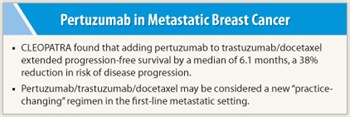 There is an emerging theme in HER2-positive breast cancer: The greater the pathway inhibition, the better the outcome. The latest evidence comes from the phase III Clinical Evaluation of Pertuzumab and Trastuzumab (CLEOPATRA) trial of 808 patients with previously untreated metastatic disease. The results were presented at the 34th San Antonio Breast Cancer Symposium by Jose Baselga, MD, PhD, of Massachusetts General Hospital Cancer Center and Harvard Medical School, Boston.1
There is an emerging theme in HER2-positive breast cancer: The greater the pathway inhibition, the better the outcome. The latest evidence comes from the phase III Clinical Evaluation of Pertuzumab and Trastuzumab (CLEOPATRA) trial of 808 patients with previously untreated metastatic disease. The results were presented at the 34th San Antonio Breast Cancer Symposium by Jose Baselga, MD, PhD, of Massachusetts General Hospital Cancer Center and Harvard Medical School, Boston.1
In CLEOPATRA, the addition of pertuzumab to the standard trastuzumab (Herceptin)/docetaxel regimen extended progression-free survival by a median of 6.1 months.
“This is huge,” Dr. Baselga noted. “It is very uncommon to have a clinical trial show this level of improvement in progression-free survival.”
Like trastuzumab, pertuzumab is a monoclonal antibody that binds to the HER2 receptor protein but in a different region. Pertuzumab prevents the receptor from linking to HER3, which stops the formation of a dimer that will further enhance tumor growth. It is the first in a new class of agents called “dimerization inhibitors,” and in combination with trastuzumab, helps to provide dual blockade of the HER2 growth factor.
Progression-free survival was 18.5 months for patients receiving pertuzumab vs 12.4 months for trastuzumab/docetaxel alone—a 38% reduction in the risk of progression (P < .0001). Adding pertuzumab to the combination also yielded responses in 80.2% of patients, compared with 69.3% with standard therapy.
May Be Practice-changing
 “CLEOPATRA met its primary endpoint and demonstrated a statistically significant and clinically meaningful improvement in progression-free survival. This new regimen may be practice-changing in HER2-positive first-line metastatic breast cancer,” Dr. Baselga suggested.
“CLEOPATRA met its primary endpoint and demonstrated a statistically significant and clinically meaningful improvement in progression-free survival. This new regimen may be practice-changing in HER2-positive first-line metastatic breast cancer,” Dr. Baselga suggested.
Although survival outcomes are not mature, there were 69 deaths among the 402 patients treated with the three-drug regimen vs 96 among the 406 patients receiving pertuzumab. Pertuzumab added minimally to toxicity, and Dr. Baselga called the three-drug combination “remarkably safe and well tolerated.”
Enrollment is underway for a double-blind, randomized clinical trial, APHINITY, to test pertuzumab as adjuvant treatment for early-stage HER2-positive breast cancer—“the setting in which you can really cure patients,” Dr. Baselga said. ■
Disclosure: Dr. Baselga has served in a consultant or advisory role for Novartis.
SIDEBAR: Lessons Learned from Other HER2 trials
Expert Point of View: Dual HER2 Blockade Substantially Delays Disease Progression
Reference
1. Baselga J, Kim-SB, Im S-A, et al: A phase III, randomized, double-blind, placebo-controlled registration trial to evaluate the efficacy and safety of pertuzumab + trastuzumab + docetaxel vs. placebo + trastuzumab + docetaxel in patients with previously untreated HER2-positive metastatic breast cancer (CLEOPATRA). 2011 San Antonio Breast Cancer Symposium. Abstract S5-5. Presented December 9, 2011.

 C. Kent Osborne, MD, of Baylor College of Medicine, Houston,...
C. Kent Osborne, MD, of Baylor College of Medicine, Houston,...